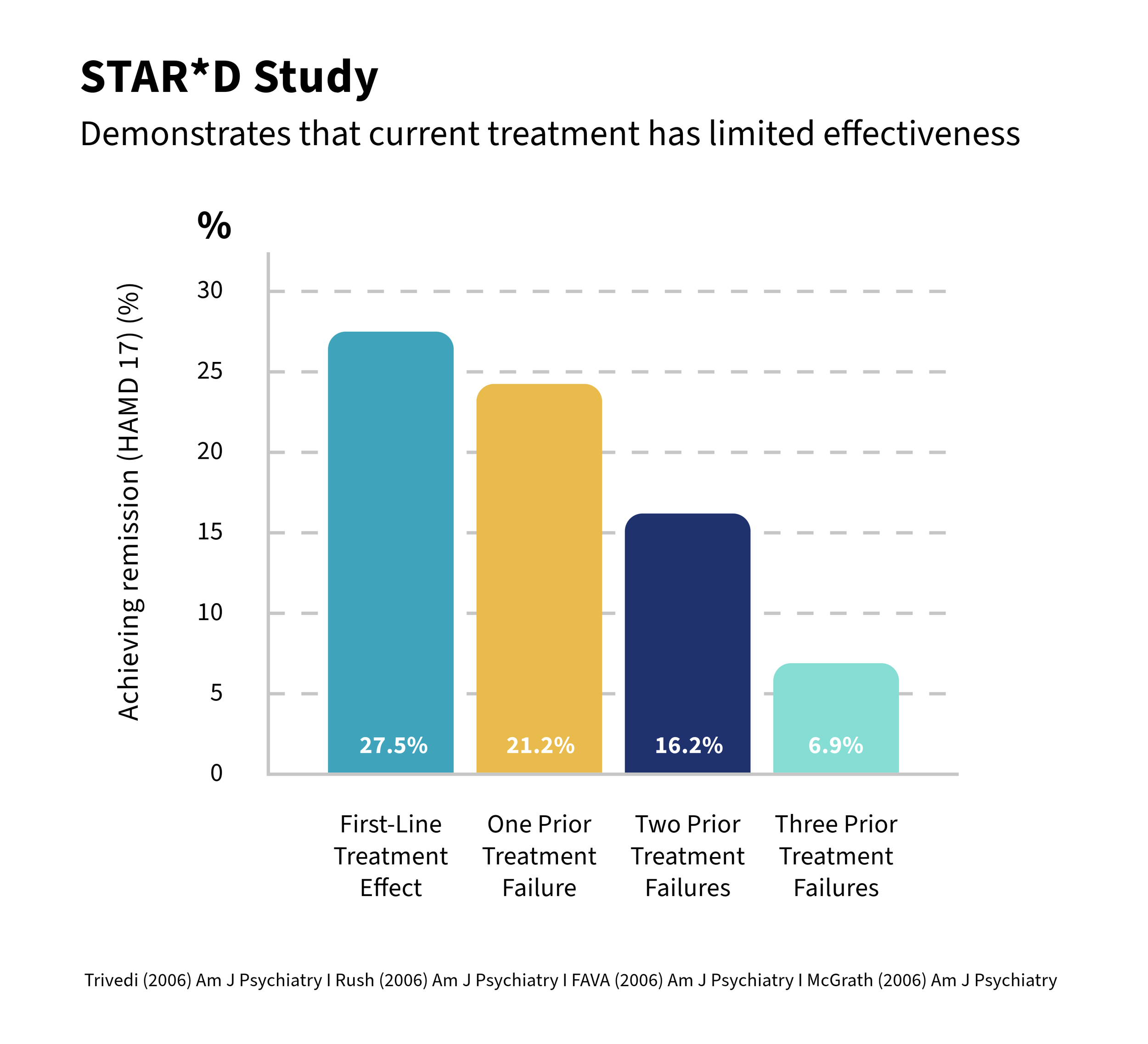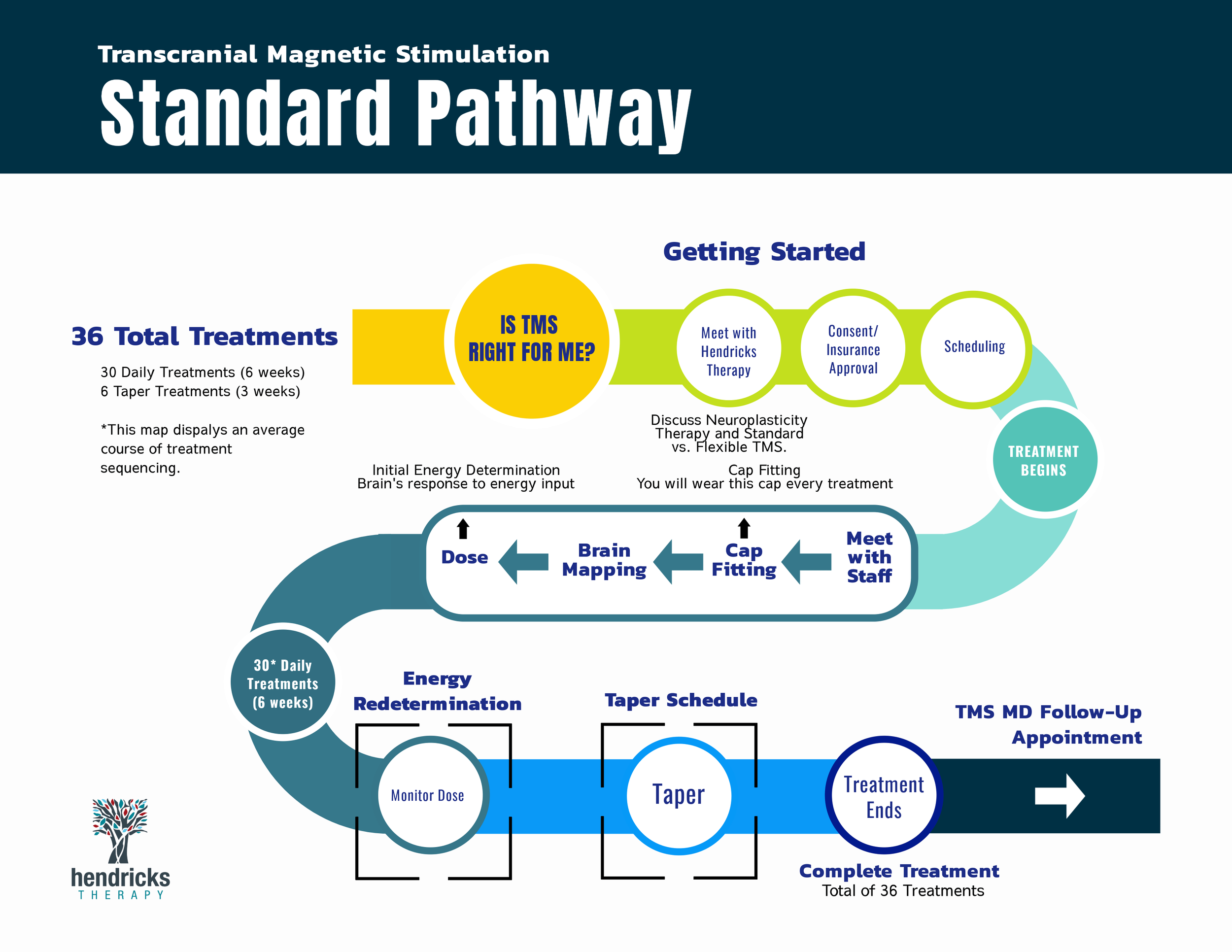
TMS Could Be the Treatment Solution
If Your Patients Have Tried Multiple Antidepressants With No Relief
Depression Starts In The Brain
Depression is a electrochemical dysfunction that causes reduced brain activity.
TMS boosts brain activity.
Transcranial Magnetic Stimulation (TMS) is a medication-free treatment for depression. TMS utilizes MRI-strength magnetic fields to deliver magnetic pulses that stimulate nerve circuits in the brain involved in mood regulation and depression. It activates regions of the brain that exhibit reduced activity during depressive episodes. TMS is a non-invasive, office-based procedure cleared by the U.S. Food and Drug Administration (FDA) in 2008 for treating Major Depressive Disorder. TMS is covered by most insurance carriers including Medicare. Typically, TMS is considered when other depression treatments have not been effective.
This decline in antidepressants’ effectiveness essentially mirrors the findings from randomized and naturalistic, prospective studies reporting a 20%–30% loss of effectiveness with each increase in the number of prior antidepressant trials.27–32 Furthermore, several recent analyses suggest that the sequential application of antidepressant medications for non-remitting depression may in fact foster treatment resistance for many patients.33–36
With the Apollo TMS Transcranial Magnetic Stimulation Patients Experienced
How it Works
TMS is a non-invasive treatment that uses magnetic pulses to stimulate areas of the brain, specifically, the dorsolateral prefrontal cortex (DLPFC). This region of the brain is often affected by depression and other mood disorders. During a TMS session, an electromagnetic coil is placed over the patient's scalp, directly above the DLPFC. This coil then delivers a series of magnetic pulses at specific intervals to stimulate nerve cells in that area, helping to restore normal brain activity.
TMS Boosts Brain Activity
PET Scan showing the activity of a depressed brain vs a non-depressed brain.
Flexible and Affordable TMS Therapy with Neuroplasticity Support
Transcranial Magnetic Stimulation (TMS) is an excellent treatment for depression, but we understand that not everyone can commit to the standard schedule of five sessions per week for six weeks, followed by a tapering period. Additionally, some patients face financial barriers or lack health insurance. Research indicates that reducing the frequency of sessions to three times per week can yield results comparable to the conventional schedule. While once or twice-weekly treatments are less effective, they can still provide meaningful benefits.
To make this transformative therapy more accessible, we offer each individual TMS treatment at a significantly reduced cost, less than one-third of the typical rates found at other centers. Patients who choose this option will also participate in our Neuroplasticity Therapy, which focuses on replacing negative thought patterns and behaviors with positive, life-enhancing ones. This holistic approach supports your journey to lasting mental wellness while accommodating your schedule and budget.
19-Minute Treatment Sessions
TMS treatment is ideal for most patients with treatment-resistant depression. TMS is not recommended for individuals who are pregnant, have a history of seizures, or have any metal objects in their heads. Patients with pacemakers should first consult their cardiologist.
When Referring a Patient
Please note that most insurers require documented failure of at least two antidepressant trials before approving standard TMS therapy. Also, the patient's facesheet and reason for referral would be greatly appreciated. Thank you!
Your referral allows us to work together to ensure your patients receive the best possible care.






